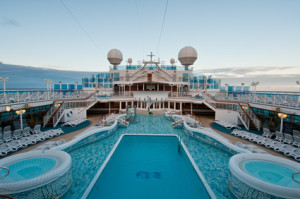Cruise Lines Avoiding the U.S. Legal System

The one thing that a lot of people don’t realize, even when they are purchasing cruise ship passenger vacations is that while the cruise line has a corporate headquarters here in the United States the ships themselves are not registered in the U.S. Passengers board in here at various ports and disembark, but the vessels are not American flagged. Instead they are carrying flags of another country, which means they go by the laws of that country and not U.S. laws.
Why, Oh Why Would Cruise Line Companies do This?
There is good reason why cruise line companies choose to have their vessels registered in certain countries instead of the United States. There is less oversight, government involvement, and more legal freedom because their laws are not as extensive as ours. The most common countries used by the cruise line industry are places like Liberia, Panama and Malta, which results in the cruise line protecting their own interests. So where does the protection for the passenger fit into this type of business plan? It doesn’t.
How Safe are Passengers at Sea?
Knowing that cruise ships are not registered under the law United States passengers follow, how safe are they at sea? Crime occurs on these vessels the same as it could in any city or town in the U.S. the difference is the country where the ship is registered is the controlling government. In other words that country’s laws will be adhered too. Where does that leave the American passenger who purchased their ticket in the U.S., boarded at an American Port and will disembark in the U.S.?
The passenger that is a victim of crime is faced with little in response by any of these countries, since they are not equipped or capable of protecting American passengers or providing the justice they expect.
What’s the Answer?
American passengers are consumers and Congress has taken the issue of cruise ship crime and injury seriously passing the Cruise Vessel Security and Safety Act (CVSSA) in 2010 to protect citizens that are unaware of the dangers and inadequately informed. The bill took five Congressional hearings and passed with as few as four dissenting votes. The bill was clear in making it known there is a need to improve safety for passengers and also for crewmembers aboard cruise ships. This was a historic victory for proponents of cruise ship legislation.
Why isn’t this the End?
Five years after this legislation has been voted in there are still issues with the cruise line industry not adhering to the requirements and provisions outlined in the bill. They are also not being enforced as was intended by Congress. In January of 2015 the U.S. Coast Guard revealed that the proposed regulations in the CVSSA that was put out by them have been as heartily enforced.
These concerns have been addressed by the media to a point and even more so by law firms concerned with passengers being unaware of the crimes, injuries and medical care onboard cruise ships. The cruise line industry is playing the legal system and U.S. Maritime law and there is a turn over with security personnel and many times instead of being able to handle a situation properly the cruise line is more concerned with covering up.
The International Cruise Victims Association an advocacy group has had to resort to going to Congress and the media with stories of victims, trauma and neglect by the cruise industry to fight for effective regulations and regulators. The other side of the coin is that the cruise line industry has millions to spend hiring former government employees lobbying legislators to influence regulations though this has not gone unnoticed.
In a joint letter by Sen. Blumenthal and Rep. Matsui to the Commandant of the Coast Guard proves they are aware of the tactic. Sen. Rockefeller made a statement at the closing of last July’s congressional hearing concerning the cruise industry. Where do travel agents weigh in on the cruise line industry issues? Most are concerned with the problems. Passengers should also be aware and concerned with the handling of crime, injury and medical care aboard these ocean going vessels.
Other Resources:
“Cruise Ship Strict Liability Law & Common Carrier Liability” – Ehline [1]
